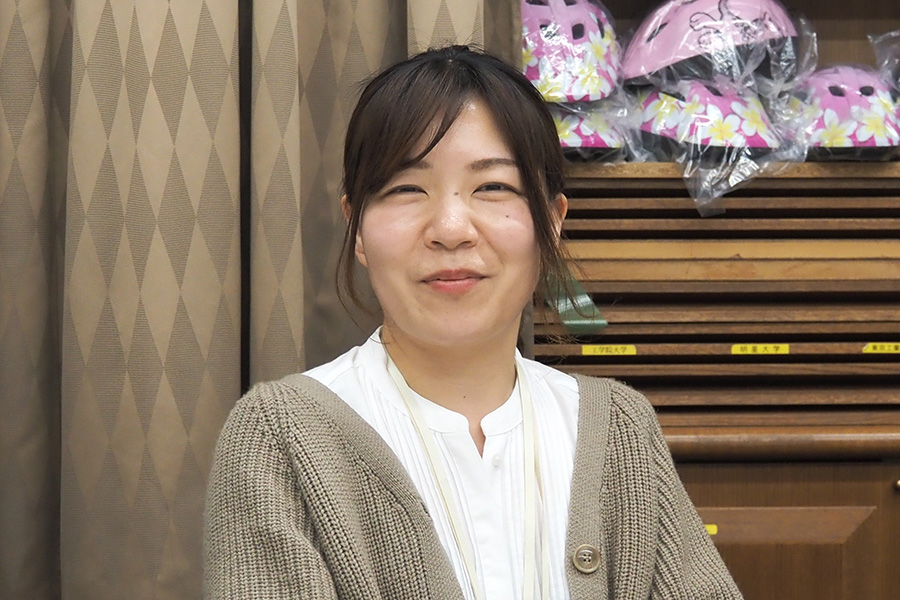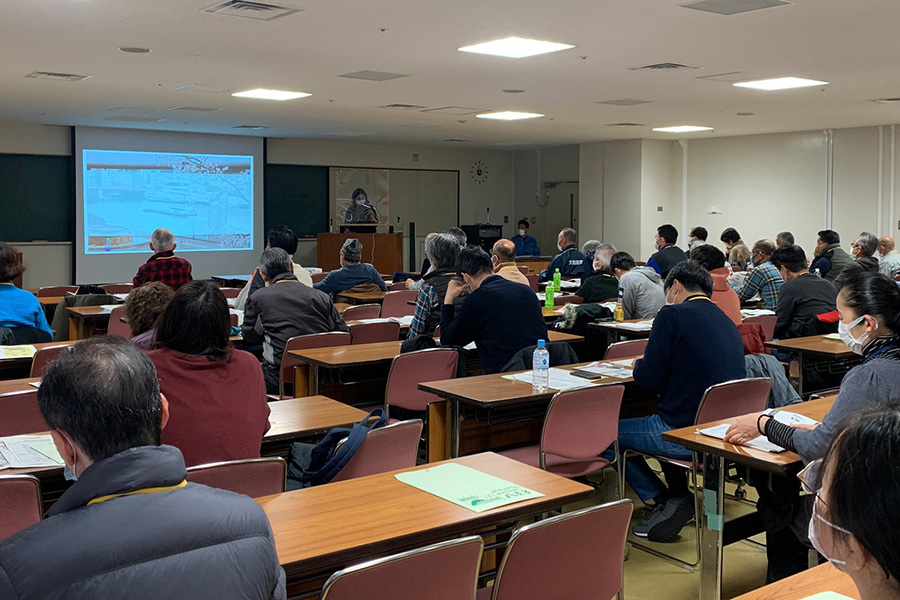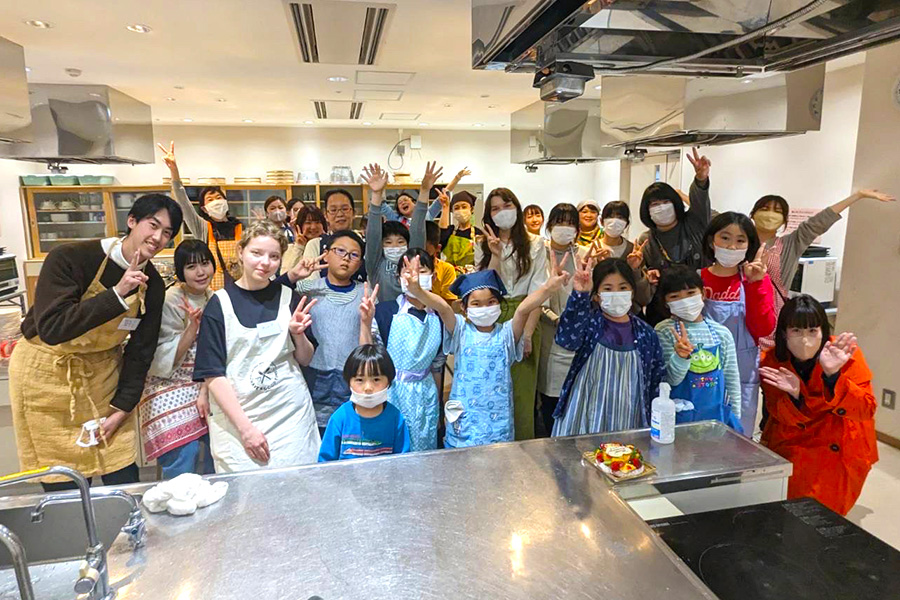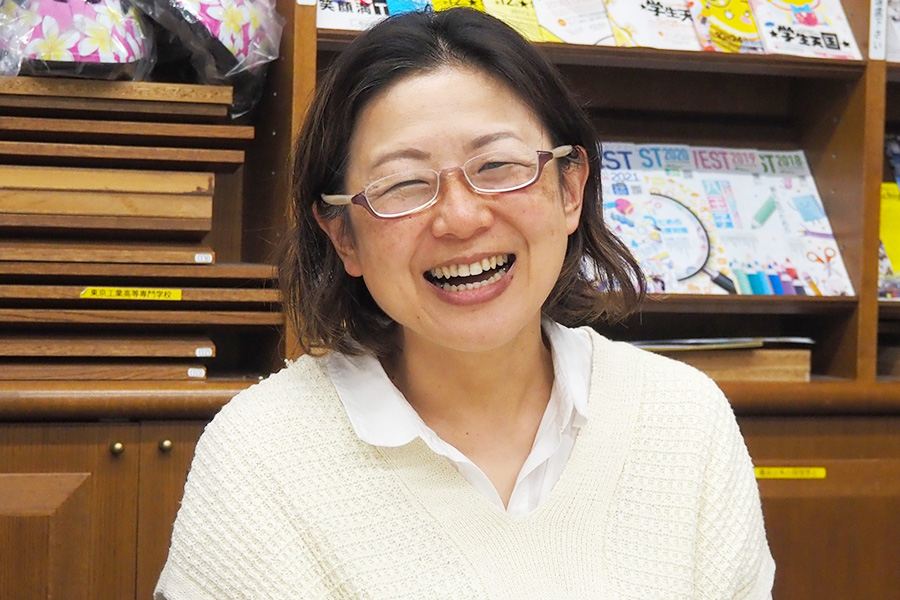Close UP
kokohana Yasashii Nihongo de Tsunagaru Hachioji no Kai ~Expanding the Circle of Plain Japanese and Multiculturalism in Hachioji~

Hachioji City is home to approximately 14,000 foreign residents (as of December 2022). The number of foreign students is substantial, and the population of foreign residents is increasing year by year. To make Hachioji a city where both Japanese and foreigners may live comfortably, the "kokohana Yasashii Nihongo de Tsunagaru Hachioji no Kai" (hereafter: kokohana), is engaged in various activities, including the promotion of Plain Japanese. We interviewed the two core persons of the organization, Ms. Akane Miyatake, a representative, and Ms. Kumiko Matsubara, a staff member.
An Encounter of Two People Who Share the Same Thoughts

Ms. Miyatake and Ms. Matsubara met as fellow volunteers of the Hachioji Nihongo no Kai. "We were both Japanese language teachers and had taught Japanese as volunteers in different classes. Coincidentally, we had both been wanting to promote the Plain Japanese from our respective experiences. When I met Ms. Matsubara and learned that we both had similar ideas, we hit it off immediately and decided to start an organization together," says Ms. Miyatake. They met in the spring of 2021 and established the organization in the summer of that year. Ms. Miyatake looks back on those days as follows, "When I thought that there were 'fellows' all over Japan who were working on Plain Japanese, I felt that we had to do it in Hachioji immediately." The name "kokohana" was given to the organization with the hope that "here"(koko) would become a place where people "could speak"(hanaseru) with each other.
It was when Ms. Matsubara saw off the first graduates of the Japanese language school, she had taught that she felt the urge to work on spreading Plain Japanese. "I had a hunch that these students, who had studied Japanese so hard, would have a hard time in Japanese society in the future. Even if they put in a lot of effort and learned a lot, it would be hard for them to catch up to the native level. Not only did we expect them to improve their Japanese, but we thought it would be easier for both parties to live together if the Japanese people around them would speak Plain Japanese. Now, we are working with the expectation that half of the citizens of Hachioji City will be able to know and speak Plain Japanese."
Ms. Miyatake and Ms. Matsubara say that the reason they quickly established the organization and have been constantly active until today is that they both had similar thoughts. "We have the same engine. It is our hope to make Hachioji a city where all people, both Japanese and foreigners, may live in comfort and peace of mind. To realize this idea, we are engaged in various activities, including the promotion of Plain Japanese."
Spreading Plain Japanese is Win-Win-Win.

Since kokohana's establishment, they have been offering Plain Japanese basic class (Yasasii Nihongo no kihon koza). Currently, the class is held about once every two months, with Ms. Matsubara serving as the instructor. Each class is attended by a variety of citizens, including those who want to make use of Plain Japanese in their daily work, retirees from work, and students.
Ms. Miyatake and Ms. Matsubara heard a pleasant episode from a student of this course, that was after the students attended the class. One day the trains stopped. A foreign passenger asked a station staff at a station why the train was stopped, but the passenger seemed to not understand the station staff’s explanation very well. The student who saw the situation interpreted, in Plain Japanese, between the passenger and the station staff. This allowed the passengers to understand what the station staff had said. The station staff wondered, "I was speaking Japanese as well, so why did the foreign passenger (only) understand you when you spoke it?"
"A foreign supporter who helped with the course once told me, ‘I am glad that Japanese people are willing to study for us foreigners.’ I feel that such words coming (from them) means that the meaning of speech is not always conveyed. So, I am happy to have episodes like this that spread the use of Plain Japanese," says Ms. Matsubara.
Ms. Miyatake and Ms. Matsubara explain their activities to promote Plain Japanese as "a win-win-win situation: people who learn are happy, foreigners who are able to communicate are happy, and we are happy."
Plain Japanese becomes “a very good solution that we had never thought of “in the field of disaster preparedness.

In FY2022, kokohana held a Plain Japanese classfor disaster prevention instructors at the request of the Hachioji City Hall. When they asked the participants if they had ever tried to imagine what it would be like to have foreign residents in shelters, only a few said YES. "For those involved in disaster prevention, the concept of Plain Japanese as a communication language with foreign residents seemed to be a new concept from a completely new perspective. We received a great response from the participants, with some saying it was a very good solution that they never thought of."
"To make people feel familiar with Plain Japanese, we try to create classes that make it easier for them to imagine actual situations. We want them to learn with ease, so we tell them, ‘It's fun, and when you learn it, it will be easier for both parties," says Ms. Miyatake.
They feel that interest in Plain Japanese is gradually spreading in the city, as they receive an increasing number of requests for classes and interviews for their organization.
Conveying and Expanding "Multiculturalism" in Cooking Classes and at an Elementary School

In addition to activities for spreading plain Japanese, kokohana also focuses on activities for deepening multiculturalism and international understanding, and, activities for parents and children who have roots overseas. Ms. Miyatake says, "When I tell people that I am involved in activities related to foreign residents, I am often told, ‘So, you can speak English.’ Many people still have the impression of 'foreigners = English (language)'. Given this context, we thought it would be difficult to convey why it (Plain Japanese) is necessary just by offering classes of Plain Japanese. We wanted Japanese people to experience various cultures and feel closer to residents who have roots in foreign countries."
Other than the conversation-based social events, Chinese and Ukrainian cooking classes were also held. Cooking is a very good topic, a clue to everyone's interest. In the Ukrainian cooking class, evacuees from Ukraine were invited as instructors to make borscht, salad, and Ukrainian crepes. Ms.Miyatake and Ms. Matsubara say, "(Cooking classes can be a) place for foreign residents to play an active role, and it would be best if they could enjoy international exchange without building barriers."
Since the number of children with foreign roots is increasing in Hachioji, kokohana has also been providing classes about multiculturalism at an elementary school in the city for two years now. They are planning to further expand kokohana’s activities in the field of education in the future.
Kokohana's activities are meaningful particularly because they take place in Hachioji.

Foreign residents in Hachioji City come from more than 160 countries. Since each of them has a different native language, there are limitations to multilingual support. Therefore, it is said that there is a need for Plain Japanese. Ms. Miyatake describes Hachioji as a place where foreigners gather easily. "Hachioji is easily chosen as a student’s first residence because Hachioji is a university town. People are surprised at how different (Hachioji) is from their image of Tokyo because it’s too affluent in nature. However, Hachioji is far from the center of Tokyo, and many students tend to move out when they finish university. If we could create a city where people would want to live after graduation, that would be wonderful."
Hachioji is said to have an environment that is conducive to civic activities, and the Citizen’s Activity Support Center provided a wide range of support when kokohana was established. "The activities and communication among citizens are very active, and that is one of Hachioji's charms. Our activities have great significance particularly because we are located in Hachioji, a place that has two unique characteristics: a large number of foreign residents and a thriving civic community. If we can increase the number of people who connect with each other using Plain Japanese, I think the town will become more interesting," says Ms. Miyatake. We hope that the circle of Plain Japanese connections will expand in Hachioji, along with the cheerful and friendly disposition of Ms. Miyatake and Ms. Matsubara.
*This article is based on information available at the time of the interview. For the latest information, please contact the organization directly.
